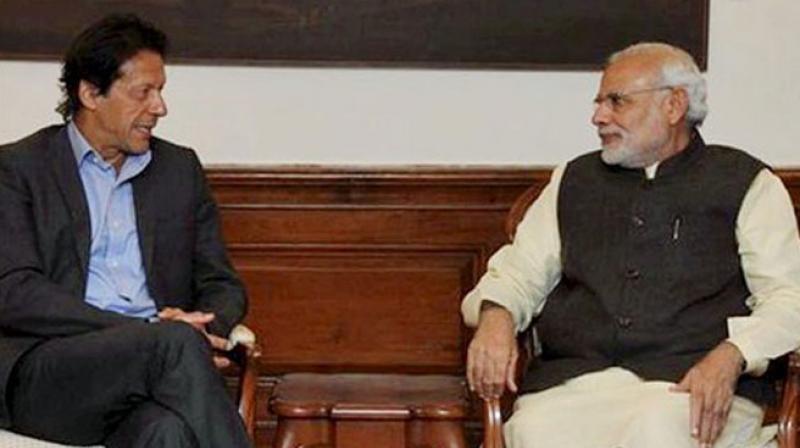Clearly, Pakistan’s regime has keenly committed to wide-ranging normalization with India. It announced that it will take two steps, if India takes just one. It invited the Indian foreign minister to the Kartarpur Corridor inauguration, which was rebutted by the Hindu State. It has unilaterally declared that war is not an option, whilst India has made no such assurances. In fact India has busied itself in developing a cold start military strike option, to work around mutual nuclear capability.
Furthermore, it has congratulated India on Hindu festivals, whilst the Indian army chief has sternly demanded Pakistan becomes more secular if it wants peace. It has appealed to India to play a role in a settlement in Afghanistan, where India already has a substantial presence that has been key to destabilizing Pakistan, in Baluchistan and beyond. It has called for free trade and open borders with India, even whilst accusing India of being bent on sabotaging Pakistan’s Norm.
Normalization with India, the one way compromise play is portrayed as a victory. It is claimed that the lack of Indian reciprocity to Pakistan’s overtures will expose India in the international community. Moreover, the regime is assuring the people that normalization with India is the key to prosperity and security.
The policy of Normalization with India must be reconsidered and abandoned. Running along with normalization, the regime is not reading India, or regional situation or the international community, right. Had it done so, it would have abandoned this policy of surrender.
The case for abandoning normalization with India is crystal clear. As for India, it is inherently hostile to Muslims and Islam. Its brutality within Occupied Kashmir as well as the BJP-led pogroms against Muslims in Gujrat are evidence of its anti-Muslim bias. Modi is using Afghanistan as a launch pad for destabilizing Pakistan is further evidence in this regard. Modi’s dam programme to afflict Pakistan with drought is yet another evidence. India’s inability to provide justice and prosperity for people within its borders, further establish that it is not fit for a wider regional role. Indeed, Pakistan’s decades old stance of treating India as a hostile state was not without wisdom or reason. Arrogantly dismissing decades of policy outright and adopting the opposite to establish “New Pakistan” credentials, shows the regime’s insincerity towards core Muslim interests in the region.
As for the regional situation, it is determined by the US policy for the region, implemented by states which act according to it. Under Modi, India is fully on board with the US plan for India to become the dominant regional power, to act as a counter to China and the Muslims of the region. The US has used its influence over the rulers in Afghanistan and Bangladesh to enhance Indian strategic depth in both, outflanking Pakistan. The US is using its influence over the current Pakistani regime to remove Pakistan as an obstacle to the rise of India and accept to play second fiddle to an Indian regional head. Bearing in mind the reality of India, how can its regional supremacy bring security and prosperity for the region? Why should Pakistan resign itself to facilitating India’s rise?
As for the international community and appealing to its better nature, it is also a non-starter. Firstly, there is nothing truly international about it. In reality, it is merely a euphemism for the balanced interests of the five great powers, the US, Russia, France, Britain and China, the latter of which is a great power but within the region alone. Regarding Islam and Muslims, all five greater powers are evidently hostile in their stance towards Islam and Muslims and their interests are aligned in this case. Even China, despite its mutual hostility and rivalry with India, is savage in its onslaught against Islam within its borders, which includes internment camps for practicing Muslims. Its support for the brutal Myanmar regime is also an indication of its hostile regional policy towards Islam.
Security and prosperity for the long-suffering Muslims of the region, lies in Islam. It is Islam that allowed the region to rise for centuries. And it is Islam alone that will allow it to do so again. Pakistan is central to that change, being the strongest Muslim state within the region, if not within the entire Ummah. Rather than making concessions and appeals to hostile nations, Pakistan must become the starting point for the Khilafah (Caliphate) on the Method of the Prophethood which will ensure that the interests of the Islamic Ummah are protected through continuously developing its capabilities independently of those with designs against it. Allah (swt) said, وَإِنِ ٱسْتَنصَرُوكُمْ فِى ٱلدِّينِ فَعَلَيْكُمُ ٱلنَّصْرُ “If they seek your support in Deen, it is your duty to support them” [Surah Al-Anfal 8:72]
Musab Umair – Pakistan

